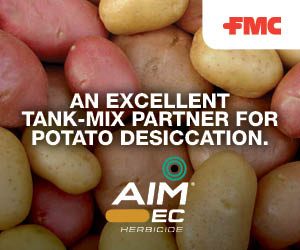| |
| |
 |
 |
| |
 |
|
@{mv_date_MMM d, yyyy}@ |
|
| |
 On an individual level, farms are reporting anywhere from 40 to 100 per cent progress. But, due to higher-than-average precipitation, seed rot has been reported in some wet fields.
» Read More...
On an individual level, farms are reporting anywhere from 40 to 100 per cent progress. But, due to higher-than-average precipitation, seed rot has been reported in some wet fields.
» Read More...
BROUGHT TO YOU BY - Tuber Talk
Late blight requires a fairly specific combination of climate and other external factors. Although it’s not late blight season yet, it’s a good time to know if things are shaping up in that direction. Ryan Barrett, research and agronomy specialist with the P.E.I. Potato Board, shares the conditions that result in late blight, what to look for and how to work with agronomists and local labs to learn more about late blight.
» Listen now
The investment will enable a variety of capital and equipment upgrades including improvements to irrigation and air filtration, temperature control, increases to sterilization capacity and improvements to its greenhouse coverings.
» Read More...
The $2M investment will be split between two different entities, focused on increasing competitiveness, import and export capabilities and research to help build evidence for organics through data aggregation and benchmarking.
» Read More...
For over 20 years, Robertson has been at the forefront of providing quality business and professional advice to farm families and businesses across Canada. Here, Robertson discusses her achievements, how she has transformed farm advisory services, her thoughts on the future of farming, and more.
» Read More...
|
| |
|
| |

Aim ® EC herbicide added to diquat herbicide targets leaves and stems for more complete potato desiccation versus diquat alone.
Improving vine kill sets you up for a better harvest:
- Benefits tuber appearance
- Limits tuber size
- Improves release from the vine at harvest
Always read and follow label instructions. Member of CropLife Canada. FMC, the FMC logo and Aim are trademarks of FMC Corporation or an affiliate.
©2024 FMC Corporation. All rights reserved. 13360 - 05/24
» Learn More
|
| |
|
| |
 A new genetically engineered potato developed by Michigan State University potato breeder Dave Douches has been granted exemption from the biotechnology regulations placed on genetically modified products by the U.S. Department of Agriculture’s Animal and Plant Health Inspection Service. The Kal91.3 potato is bred from an MSU potato variety, Kalkaska. The potato can be stored in cool temperatures for long periods of time without sucrose, the compound that sugar is typically stored in potatoes as, converting into reducing sugars such as fructose and glucose.
» Read More...
A new genetically engineered potato developed by Michigan State University potato breeder Dave Douches has been granted exemption from the biotechnology regulations placed on genetically modified products by the U.S. Department of Agriculture’s Animal and Plant Health Inspection Service. The Kal91.3 potato is bred from an MSU potato variety, Kalkaska. The potato can be stored in cool temperatures for long periods of time without sucrose, the compound that sugar is typically stored in potatoes as, converting into reducing sugars such as fructose and glucose.
» Read More... |
| |
| |
|
| |
|
|
| |
| |





